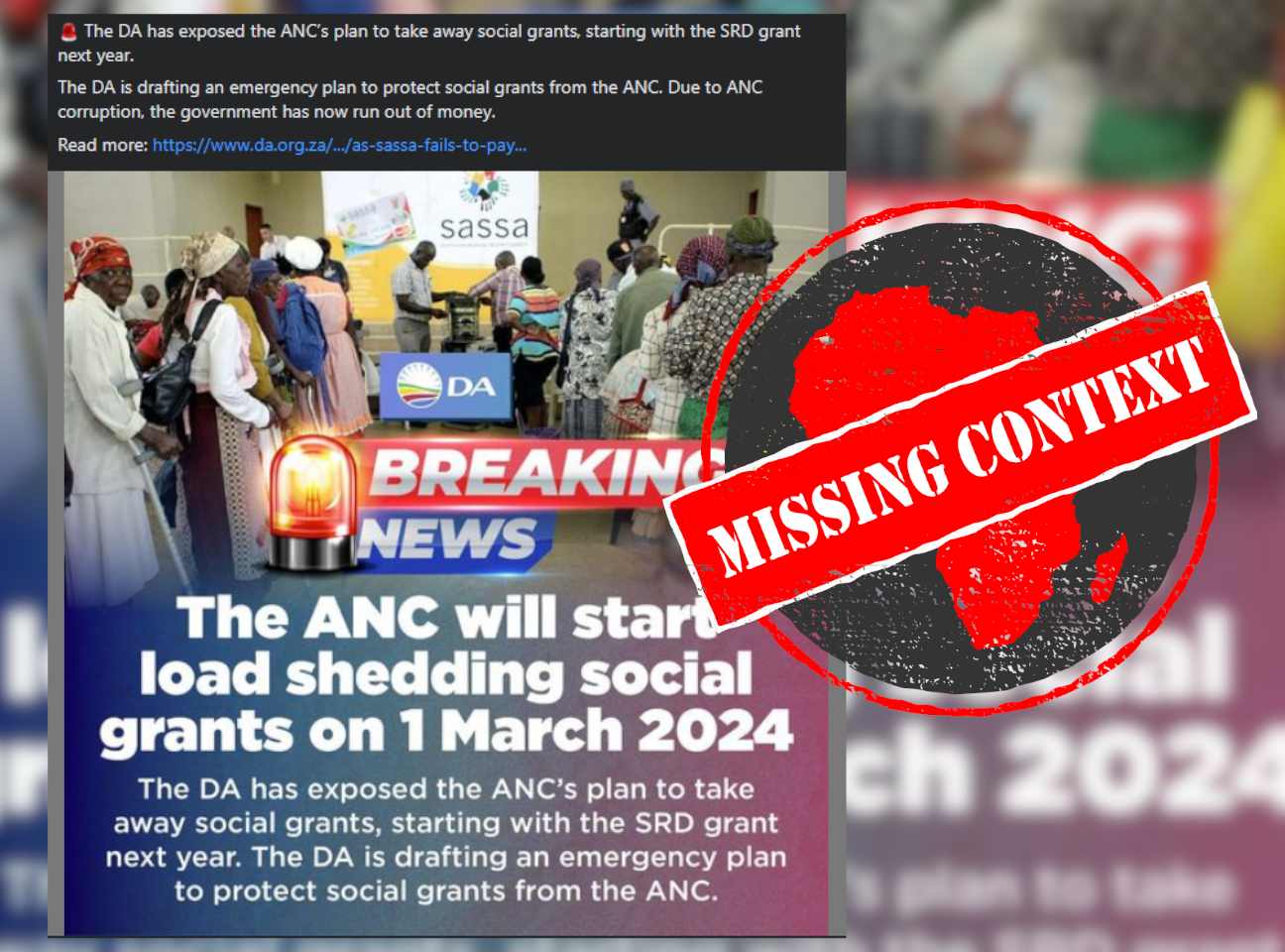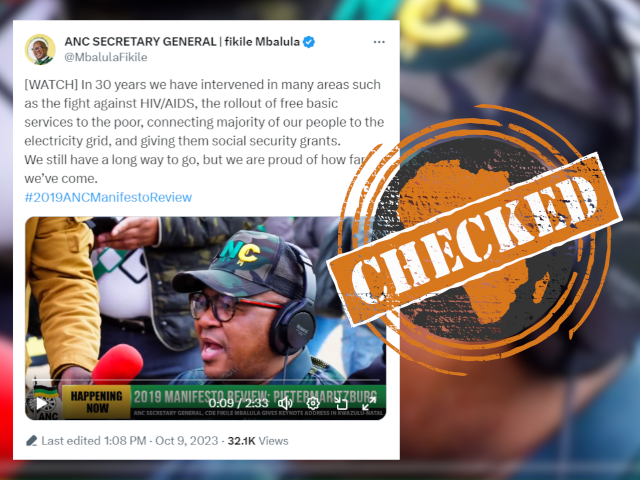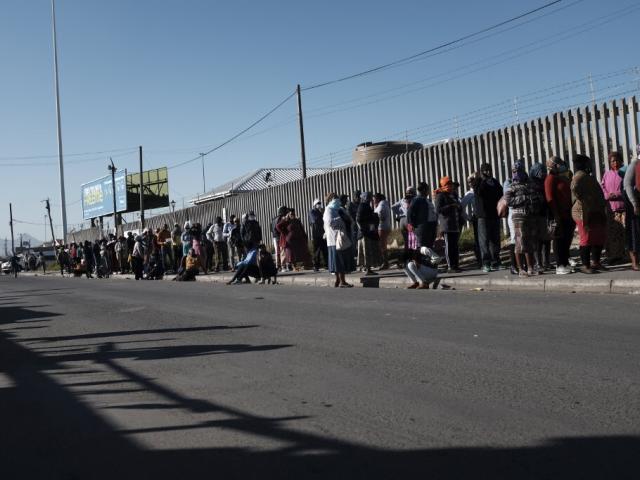IN SHORT: South Africa’s temporary Covid relief grant benefits about 10 million people, but will end in March 2024. But this doesn’t mean all social grants, for old people, children, the disabled and more, will be withdrawn.
“The ANC will start load shedding social grants on 1 March 2024,” reads a graphic circulating on social media in South Africa since March 2023.
It goes on: “The DA has exposed the ANC’s plan to take away social grants, starting with the SRD grant next year.”
The African National Congress, or ANC, is South Africa’s governing party. The Democratic Alliance, or DA, is the main opposition, among 13 other parties in the country’s national parliament. South Africa is set to hold national and provincial elections in 2024.
Load shedding refers to planned electricity outages in certain areas to relieve pressure on the countrywide power grid and prevent it from failing. South Africa has experienced extended bouts of loadshedding since late 2007.
SRD stands for social relief of distress, a form of emergency, and so temporary, social aid that’s been in South African law since 2004.
The SRD grant, also known as the R350 grant, is the special Covid-19 social relief of distress grant. It was introduced in May 2020 to help poor people survive during the state of emergency declared in response to the Covid pandemic.
South Africa has numerous social grants, paid out by the South African Social Security Agency, known as Sassa. Sassa lists them:
- Grant for older persons
- Disability grant
- War veteran’s grant
- Care dependency grant
- Foster child grant
- Child support grant
- Child support grant top-up
- Grant-in-aid
- Social relief of distress
- Covid-19 social relief of distress
About 47% of the country’s people receive a social grant. In a population of about 60.6 million, 18 million permanently receive grants and 10 million are paid the temporary Covid SRD grant.
The graphic has been posted on Facebook with alarmed comments such as “Social grant will be tempered” and “The Anc wants to take away your grants next year”.
Another user says: “As SASSA fails to pay vulnerable beneficiaries, DA exposes ANC plan to start loadshedding social grants on 1 March 2024.”
But the graphic is misleading. It leaves out important context about the temporary Covid social relief of distress grant – and South Africa’s social support system.

‘Cuts to other grants are sure to follow’?
The graphic is based on a press release issued by two DA members of parliament on 2 March 2023.
It claims “vulnerable beneficiaries” of the child support, old age pension and disability grants have been “increasingly turned away from Sassa pay-points since November 2022”. It doesn’t mention any of the other social assistance grants.
“Today, they are simply being told that there is no money in their accounts.” The MPs give no evidence for this. All they say is that the DA has been “inundated with complaints”.
They add:
In this context, the DA can reveal that the ANC government’s growing failure to pay life-sustaining social grants may not be an accident. In fact, the recently published budget reveals that the ANC plans to start loadshedding the social grants that impoverished people rely on to survive in the 2024/2025 financial year, which starts on 1 March 2024.
On page 35 of the 2023 budget review, the ANC government indicates that it will entirely abolish the social relief of distress grant on 1 March 2024. Cuts to other grants are sure to follow as the financial crisis caused by ANC corruption continues to escalate.
But there is no revelation here.
Nature of SRD grant
The South African treasury’s 2023 national budget, announced on 22 February, does not hide the end of the temporary Covid SRD grant.
A line item on page 35 of the budget review shows that while R36 billion was set aside for the Covid SRD grant in the 2023/24 financial year, no funds have been allocated for 2024/25 or 2025/26. (The government’s financial year runs from 1 April to 31 March.)
This is explained earlier in the budget review:
The future of the COVID-19 social relief of distress grant, which is currently funded until 31 March 2024, remains under discussion. Government will make a decision in line with its commitment to sustainable public finances. Any permanent increase in expenditure, such as a new social grant, will need to be matched by permanent revenue increases or spending reductions elsewhere.
The Covid SRD grant was initially intended to last for only six months, from May to October 2020. It was extended to March 2022, again to March 2023 and then to March 2024.
Social relief of distress funds were paid out to people needing emergency aid long before the Covid pandemic.
The 2023 budget shows that other social grants will continue, with increases of around 5%.
The two MPs are likely trying to be humorous or clever in referring to the “load shedding” of social grants. But load shedding is a planned process, publicly announced.
In any case, the end of the emergency, special and temporary Covid social relief of distress grant in 2024 is no indication that all social grants will be withdrawn then.
The graphic, circulating before an election year in South Africa, may mislead the many people in South Africa who rely on social grants.
Republish our content for free
For publishers: what to do if your post is rated false
A fact-checker has rated your Facebook or Instagram post as “false”, “altered”, “partly false” or “missing context”. This could have serious consequences. What do you do?
Click on our guide for the steps you should follow.
Publishers guideAfrica Check teams up with Facebook
Africa Check is a partner in Meta's third-party fact-checking programme to help stop the spread of false information on social media.
The content we rate as “false” will be downgraded on Facebook and Instagram. This means fewer people will see it.
You can also help identify false information on Facebook. This guide explains how.





Add new comment